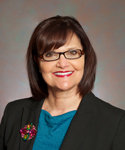Washington was one of the first states to report a death from COVID-19, and rheumatologists in the state were among the first in the U.S. to adapt their practices to mostly telemedicine appointments.
“In order to do telemedicine correctly, we understood that workflow and telemedicine had to fit together, and we had to make this transformation within a week’s time—not without its many challenges,” says Karen Ferguson, practice administrator at Arthritis Northwest, PLLC, Spokane, Wash. She spoke with The Rheumatologist about how her practice has adapted during the COVID-19 pandemic.
Q: How are you and your staff adapting to the sudden changes brought about by the pandemic?
From the onset, a major focus of our effort has been to integrate the telemedicine program within the standard workflow and electronic health records [EHR]. This work has included syncing our schedules, templates, encounters, billing and documentation requirements to satisfy our coding requirements. Now, our physicians can jump onto a telemedicine visit and document right into the EHR. Other workflow solutions involved establishing a virtual rooming process in which our medical assistant rooms the patient by calling 15 minutes prior to the patient’s appointment to review and record the patient’s history, pain, complaint, medications and other details to be discussed during the visit.
Many challenges still exist as our practice adapts to this relatively new telemedicine technology. To make it work well, it’s going to evolve over time. Creating an efficient user experience is also really important. Ultimately, we need to understand the full cost implications of a telemedicine program, the long-term challenges and benefits to the practice, and how telemedicine may fit into a value-based contract with our payers.
Q: What type of appointments are you conducting, and what are patient’s chief concerns regarding COVID-19’s potential risks and symptoms?
We are currently seeing 100% both new and established patients via telemedicine. Both physicians and staff are sharing responsibilities with these visits by either working from home or at the office. We continue to be open for infusions and have been fortunate to use our exam rooms for our infusion patients. Because Washington was the first state to declare a state of emergency, there was an immediate response from our patients, and the volume of calls [was] tremendous.
The main concerns from autoimmune-suppressed patients were if they should continue taking their medications and if they should continue to go to work and be around other people who [could potentially] expose them. Additionally, some of our payers and pharmacies have limited the [availability] of hydroxychloroquine, and this has caused concern for our patients [who] are currently on this treatment.
Q: How is the pandemic affecting you and your staff personally?
On a sliding scale, there are varying degrees of emotional distress to us all as we are trying to navigate our way through these uncertain times. The care of our patients, our staff members and families cause an emotional disturbance even to the most optimistic person. At our practice, a long-term strategy for sustainability has become a central focus point. We continue to have a healthy skeptical concern about what will happen once the crisis is over: Will payers pull back telemedicine parity payments? Will practices that accept loans or financial support be fined or audited because of unestablished and unclear auditing, reporting and accounting guidelines beforehand? Will we be able to demonstrate to payers that through it all, rheumatology practices are a central part of patient-centered care?
Using telemedicine as part of rheumatology practice moving forward may seem less than ideal without the physical examination component. However, with some coordinated effort, we are realizing that anything we can do on the technical innovation side to speed the amount of time for patient accessibility, treatment therapy and clear ability to demonstrate better outcomes has a place in value-based care. There is no doubt patient satisfaction will increase as patients have expressed appreciation at easing their fears during these uncertain times.
Carina Stanton is a freelance science journalist based in Denver.



